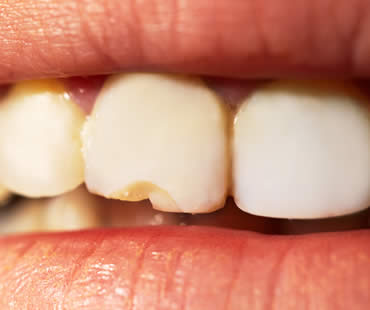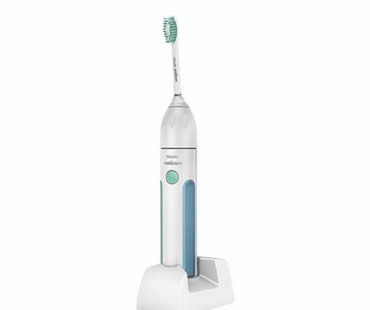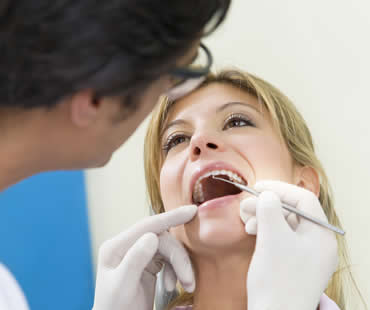
When you have a tooth or multiple teeth with extensive damage, your dentist may recommend a crown or bridge to restore your smile. Most of the time these restorations provide complete and successful results, but occasionally problems arise.
Tooth decay:
Good hygiene is imperative after a crown or bridge because plaque can build up in the area where the tooth and crown meet. Your crown can’t decay, but your tooth still can. Follow your dentist’s instructions for proper brushing, flossing, and fluoride use.
Gum disease:
Plaque buildup around a crown can cause gum disease called gingivitis, and if untreated advance to periodontitis.
Chipping or breaking:
Crowns and bridges are susceptible to damage like fracturing or chipping. Many crowns are made of porcelain, which can chip or completely fail. Heavy wear or stress such as teeth grinding can cause this type of damage, as well as an accident like hitting your restoration. Small chips may be repaired with composite filling, but larger damage can mean total replacement.
Incorrect color:
When having your crown or bridge made, you can choose from a selection of colors. However, the whitest shade is not advised because it likely won’t match the rest of your smile or it can look fake. Make sure you consider the color carefully or else you’ll be faced with redoing the restoration if you dislike it.
Falling out:
Several problems can cause your crown to fall out. The core may fail so that the interior portion of your crown is unable to provide a strong base for the restoration. Less likely, the cement can fail so that the crown simply needs stronger adhesion. Or, the post crown can dislodge so that you’ll see a large post sticking out of your crown. If your crown falls out, be sure to save it for your dentist in case it can be reinserted.
In most circumstances, these problems with your crown or bridge do not occur and you can enjoy a long lifespan with your restoration. If you do notice any of these issues, schedule an appointment with your dentist to ensure optimum oral health.
We treat patients from Meriden and the surrounding area

One of the greatest gifts you can give yourself is taking care of your oral health throughout your life. Practicing a consistent dental hygiene routine and maintaining regular visits to your general dentist are the best ways to increase your chances of a beautiful, healthy smile.
General dentists focus on preventive care and treating minor problems before they have a chance to worsen into serious issues. Even if you regularly brush and floss your teeth, plaque and tartar can be quick to develop. A dentist has the necessary tools and training to remove damaging deposits before they harm your smile. In addition to professional cleanings and examinations, most general dentists fill cavities, perform root canals, whiten teeth, and even offer additional cosmetic dental procedures like dental implants or veneers.
One of the main reasons for routine examinations is to identify various problems. One common issue that you want your general dentist to catch early is gum disease. When it is treated soon after it starts, you are more likely to avoid bone deterioration or tooth loss. The early stage of gum disease is called gingivitis and can be handled by your dentist with simple techniques. If it advances to periodontitis, that’s when bone or tooth loss become a possibility and more invasive procedures like scaling or root planing may be required.
Once you make your dental appointment, which is typically recommended every six months, make sure you keep your scheduled visit. Many patients fall victim to scheduling appointments and then cancelling, not realizing how important seeing your general dentist can be. If you have dental insurance, you can even use your dental benefits for examinations and treatments. This office accepts Blue Cross/Blue Shield of Louisiana, MetLife, and Cigna.
Choose a qualified general dentist and establish a long-term relationship now, so that you can enjoy your healthy and appealing smile for years to come.
If you live in the Meriden area contact us today

Restorative dentistry has made incredible advancements in the technology of restorative dental materials, and there are more options than ever today for your dental crown or dental bridge. Zirconium and porcelain have proven to provide lasting strength and durability, exhibiting the most natural cosmetic dental restorations available today. Each tooth in each mouth is different, however, and in some cases, resin composite or metal alloy might be the choice recommended for you.
Metals are a common choice for dental crowns and dental bridges. Gold or palladium alloys, as well as chromium or nickel (base-metal) alloys can be excellent choices. Metal alloy crowns show the least “wear down” over years of use. They almost never chip, break or wear down opposing teeth. The primary complaint about metal alloy materials is that their color is metallic and thereby unnatural. They will not blend with the surrounding teeth, and as such, they are chosen more for back molars where they won’t draw attention.
Dental composite/resin materials are a popular choice that can be made to blend with the surrounding teeth, but they’ve been shown to wear down over time and are more prone to fractures and breaking than other materials.
Porcelain can be fused to metal to form a natural-appearing crown or bridge, and because of their appearance, are a good choice for front or back teeth. Over time, however, discoloration can appear along the gum line as the porcelain wears away, leaving a dark, unsightly line. The porcelain can be fused to zirconium, however, which eliminates the dark line and is a good cosmetic choice for front teeth.
Crowns and bridges can also be made from all-porcelain or all-ceramic materials. These materials are the best choice for natural-looking teeth of the types of dental crown and dental bridge materials available in restorative dentistry today. Because they contain no metal, they are excellent choices for patients with metal allergies. They tend to be weaker and less durable than materials containing metals, however.
Talk to your cosmetic dentist today with any questions you have regarding what type of dental crown or bridge material is best for your smile needs.
We treat patients from Meriden and the surrounding area

Dentists say that electric toothbrushes really can make a difference in your ability to clean your teeth and gums. However, not all models provide the same amount of benefits. There are some important things to know about making your choice so that you purchase the best toothbrush for your needs. Here are some guidelines to consider when selecting an electric toothbrush.
Toothbrush heads
If several people will be using the toothbrush, look for one with assorted head sizes. Adults and children need different sizes of heads for the best results. Also, make sure you choose a model with replaceable toothbrush heads. This will save you money in the long run because you’re only discarding old heads, instead of throwing away entire electric toothbrushes.
Batteries
Your electric toothbrush needs a rechargeable battery so that you’re not investing money in new batteries all the time. Also, your fully charged toothbrush should last over a week. You shouldn’t have to charge the toothbrush all the time, just like you shouldn’t have to with other electric items like your laptop.
Spinning
Some electric toothbrushes offer a special type of head that spins all the way around, which allows you to clean areas that other brushes have a hard time reaching. A spinning brush may cost a bit more, but it really does a great job of helping to fight plaque and prevent gum disease.
Warranty
Look for a toothbrush with a warranty, especially when you’re buying an expensive model. That way if something unexpected happens, it might be covered under the warranty instead of having to purchase a whole new brush.
General and family dentist in Meriden

Though sports drinks and energy drinks may provide refreshment after a workout or keep you awake to study, they can also do serious damage to your teeth. People often think of these drinks as healthy alternatives to soda, but that’s not the case. In fact, research shows that these beverages are up to 10 times worse for your oral health than cola.
The issue with sports and energy beverages comes from the high acidity. Manufacturers add acid to these drinks to balance the sugar. Even more than soft drinks, the acid in sports and energy beverages can erode tooth enamel, which increases the odds of cavities. Once teeth are weakened by decay, you become more susceptible to future problems down the road.
Another reason sports and energy drinks are problematic is the way people consume them. Because most individuals sip on them throughout the day, teeth are continuously exposed to the acid in the beverages. To minimize the risks to your oral health, consider these tips:
- Use a straw when you consume these beverages because it restricts the amount of liquid that gets on your teeth.
- Chew sugar-free gum, which promotes saliva production and rinses the acid from your teeth.
- Brush your teeth right after drinking sugary beverages to remove any residue and keep teeth healthy.
- Make H2O your first choice. Consuming lots of water and limiting intake of sodas, sports beverages, or energy drinks will help you stay hydrated and promote good oral health.
Family and general dentist in Meriden

Brush and brush and brush, but you probably will not be able to get rid of all the plaque on your teeth. Even with regular brushing, some amount of plaque will build up on your teeth and turn into a hard substance called tartar. It simply can’t be removed without professional help.
What is tartar?
Tartar is a hard, yellow or brown deposit that forms on your teeth both above and below your gum line. Any food particles remaining in your mouth after eating will breed bacteria, which creates a thin film on your teeth called plaque. Any plaque that isn’t removed with brushing and flossing will harden to create tartar.
Is it harmful?
Tartar makes the surface of your teeth rough, which attracts food particles and therefore accelerates tartar formation. If you allow tartar to continue building up, your teeth will become discolored and your gums will be at risk. You will likely develop gingivitis, in which your gums become swollen and red. They will bleed easily and become painful, and eventually can lead to tooth loss. Advanced gum disease is even linked to higher risks of stroke, heart attack, and lung disease.
How is it removed?
Tartar is too hard and stubborn to be removed with regular brushing. The only effective way to eliminate tartar is by visiting your dentist and having it removed using professional equipment. This procedure is commonly called scaling.
Can I prevent tartar buildup?
Regular brushing at least twice daily with a fluoride toothpaste can help reduce tartar formation. Unfortunately, even with proper dental hygiene, plaque buildup is inevitable over time and will become tartar. Schedule regular checkups with your dentist to have professional cleanings performed.
If you live in the Meriden area contact us today














